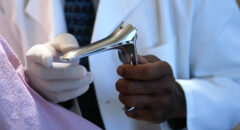
In the last decade, egg freezing has shifted from a fringe medical option to a mainstream fertility choice. It’s no longer just for women facing serious health conditions or elite career demands — it’s for anyone who wants more control over when and how they become a parent.
As a reproductive endocrinologist and fertility specialist at Advanced Fertility Center of Chicago, Dr. Olutunmike “Tumi” Kuyoro has witnessed firsthand how this technology is transforming not only fertility planning, but also cultural perceptions of motherhood, autonomy, and timing.
What’s Behind the Surge in Egg Freezing?
The rapid growth of egg freezing reflects more than just medical progress. It reveals how women today are taking charge of their reproductive futures — often on their own timelines. Dr. Tumi highlights what’s fueling the shift:
- Greater awareness: More women are learning that fertility isn’t limitless. Social media, OB/GYNs, and public health messaging are helping spread the word that egg quality declines with age — and that action taken early can make a difference.
- Delayed milestones: Many women are prioritizing career advancement, graduate school, or financial stability before starting a family. Egg freezing offers a kind of “pause button,” giving women time to get where they want to be before considering parenthood.
- Better technology: Advances in vitrification (flash freezing) have significantly boosted success rates, making the process more effective and appealing than it was even a decade ago.
- Changing attitudes: Fertility preservation is no longer stigmatized or secretive. What was once viewed as desperate or niche is now understood as proactive, smart, and self-empowering.
- Employer support: Companies are catching on. Many now include egg freezing in fertility benefits packages, reducing cost barriers and signaling support for women’s long-term reproductive health.
“Together, these trends underscore a broader message: women are seeking more control, flexibility, and freedom in how and when they build their families. Egg freezing is becoming not just a medical decision, but a reflection of evolving values around independence, planning, and empowerment,” Dr. Tumi tells BlackDoctor.org.
RELATED: Egg Freezing: The Facts
Why Age 35 Matters: The Biology of Fertility
Egg freezing is most successful when done before age 35. Why? Age is the number one factor affecting fertility outcomes. Here’s how:
- Egg quality declines: Women are born with all the eggs they’ll ever have. Over time, these eggs age — and the proportion of chromosomally normal eggs drops, especially after 35. This impacts both the chances of pregnancy and the risk of miscarriage.
- Egg quantity decreases: Ovarian reserve shrinks with age. Younger women typically produce more eggs during stimulation, giving them a better shot in fewer cycles.
- Better future outcomes: Eggs frozen at a younger age are more likely to fertilize and lead to healthy embryos, which means higher live birth rates later.
- Less uncertainty: Freezing eggs earlier can reduce the need for multiple retrievals or emergency decisions later, offering a kind of reproductive “insurance.”
“Egg freezing before 35 maximizes the chances of success down the line. It allows women to preserve their reproductive potential at a time when their eggs are healthiest, giving them more options, more control, and a better likelihood of success when they’re ready to start a family,” Dr. Tumi adds.

What Does the Egg Freezing Process Actually Look Like?
Egg freezing usually takes two to three weeks from start to finish (not counting the initial consultation). Here’s a simplified overview:
- Consultation & testing
You’ll meet with a fertility specialist, review your history, and undergo bloodwork and an ultrasound to assess your ovarian reserve. - Ovarian stimulation (10–14 days)
You’ll take hormone injections to encourage your ovaries to produce multiple eggs. Frequent monitoring tracks your response. - Trigger shot
Once your eggs are mature, you’ll take a final injection to time ovulation. - Egg retrieval
A brief outpatient procedure collects your eggs while you’re under sedation. Recovery is typically quick. - Freezing & storage
Mature eggs are flash-frozen and stored until you’re ready to use them through IVF.
Busting the Biggest Egg Freezing Myths
Many women arrive at their first consultation with misconceptions. Here are a few Dr. Tumi often hears in her practice— and how she addresses them:
- “It guarantees a baby.”
It doesn’t. Not every egg survives thawing or results in a viable embryo. Freezing improves odds, not outcomes. - “I can wait until my 40s.”
Biologically, that’s risky. Egg quality drops sharply after 35 — and by the early 40s, success rates are much lower. - “I only need to freeze a few eggs.”
Not true. Most women need 15–20+ mature eggs for a strong chance at one live birth, depending on age. - “It’s quick and easy.”
The process is safe and manageable, but it involves hormone shots, monitoring, and physical/emotional investment. - “It’s only for women who want kids late.”
Egg freezing is about preserving flexibility — not delaying for delay’s sake. It’s for women at any point of uncertainty.
“Egg freezing is a powerful but often misunderstood tool. Helping patients separate fact from fiction is essential to making confident, well-informed decisions about their fertility and future,” she notes.
RELATED: When Should You REALLY Start Worrying About Infertility?
How Many Eggs Is “Enough”?
The ideal number of eggs to freeze depends mostly on your age:
- Under 35: 15–20 mature eggs
- Age 35–37: 20–25 eggs
- Age 38+: 25–30+ eggs, often across multiple cycles
This isn’t just about quantity. It’s about attrition:
- ~75–90% of eggs survive thawing
- ~70–80% fertilize
- ~30–50% become embryos
- ~40–60% of transferred embryos (if healthy) result in live births
“If you freeze 10 eggs, you may end up with one or two viable embryos, which could be enough for one child, but it’s not guaranteed,” Dr. Tumi explains.
Managing Expectations: Hope with Honesty
One of the most important parts of Dr. Tumi’s job is helping patients balance optimism with reality. She often tells them:
- Egg freezing improves odds, but it’s not a promise.
- Think of it like insurance — not a guarantee, but a safeguard.
- It’s normal to feel hopeful, anxious, and unsure all at once. That’s part of the process.
- Planning isn’t just medical — it’s emotional, financial, and deeply personal.
“My goal is to empower patients with knowledge, honest information, and realistic optimism. Setting expectations early builds trust and ensures that patients feel informed, supported, and in control of their reproductive journey – no matter the outcome,” Dr. Tumi says.

Let’s Talk About Cost
Unfortunately, cost can be a major barrier. Here’s what to know:
- Insurance coverage is still limited, but growing. Some employers (especially in tech, finance, and law) now cover elective egg freezing.
- Costs can range from $10,000 to $20,000+ per cycle, including meds, retrieval, and freezing.
- Storage typically runs $500–$1,000 per year.
- Financing options include payment plans, fertility loans, and bundled discounts for multiple cycles.
“While the process can be expensive, understanding your options and the resources available can help you plan effectively and advocate for better access in the future,” Dr. Tumi notes.
Not Sure Whether to Freeze Now? Here’s Dr. Tumi’s Advice
If you’re in your early 30s and unsure, start with information, not a decision. Here’s what she recommends:
- Get a fertility workup: You don’t have to commit, but knowing your AMH levels and follicle count can guide your thinking.
- Check your timeline: If you want kids but aren’t sure when or how, freezing might give you more flexibility.
- Understand the age curve: Waiting until your late 30s may lower your chances and increase costs.
- Explore your feelings: This isn’t just clinical — it’s deeply personal. Honor the complexity.
- Think of it as an option, not a verdict: Egg freezing doesn’t lock you into any path. It creates space for the future, whatever that looks like for you.
“You don’t have to decide today, but don’t delay without getting the facts first. Egg freezing is about preserving options, not making promises. The more informed you are, the more empowered your choice will be – whether that’s freezing now, waiting, or choosing another path entirely,” Dr. Tumi concludes.









